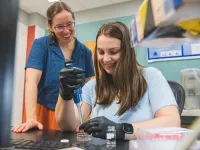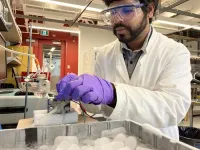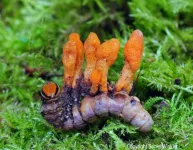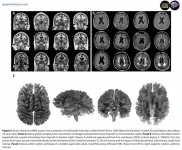(Press-News.org) It may sound like a contradiction to talk about compassion in the competitive world of elite sport. After all, isn't elite sport all about becoming hardened to resistance and adversity?
But this is a false dichotomy, according to a new study that analysed the views of 12 Danish high-performance coaches on the use of compassion in their work with elite athletes.
In fact, there is a broad consensus among the coaches, most of whom are head of national teams, about the benefits of using compassion, says the study's lead author, Emilia Backman from the Department of Psychology, University of Copenhagen.
"All of the high-performance coaches bought into the idea that using compassion has beneficial outcomes in their sporting environments. Many also feel it is something that they already practise in one way or another," she says.
"But even though the coaches saw the benefits of compassion, they still expressed some uncertainty over how to utilise compassion and the consequences of doing so."
Shifting focus to the sporting environment
In the context of sport, compassion is about more than just showing compassion. It is a tool in sport psychology that focuses on how coaches and others can recognise the athlete's experience of disappointment and adversity and thereby help alleviate distress.
This systematic attempt to alleviate the suffering of others is still an under-researched field in sports psychology, unlike ‘self-compassion’, the athletes’ own practice of being kind and understanding toward oneself during challenging times, explains Emilia Backman.
"With this study, we have therefore moved the focus away from the individual athlete and zoomed out to look at the use of compassion in the entire sporting environment. The aim has been to explore how it can support athletes, especially in terms of lasting performance enhancement, Backman says."
In the study, the 12 coaches, representing 10 different sports, point to several benefits of incorporating compassion. Among other things, it can:
Help the athlete avoid over-identifying with negative sporting outcomes
Stimulate human connection and mutual understanding between coach and athlete
Foster unity and cooperation in an otherwise competitive sporting environment
And finally: Establish the trust that allows the coach to push athletes to enhanced performances
Sometimes athletes need a push
Despite their positive assessments, many coaches are also unsure about what compassion means in practice, as the coaches have to balance understanding the needs of individual athletes with the pressure to perform.
According to Emilia Backman, it is therefore important to develop and concretise compassion as a tool that can be adapted to different sporting contexts and situations.
"For example, compassion is not just about sitting next to someone when they're crying and tapping their back and saying it's going to be okay. Sometimes the compassionate thing to do is to be able to push your athletes. The difficult aspect of that, like some of the coaches also mentioned, is finding this balance of doing one or the other."
At the same time, she wants to challenge the notion that compassion is a form of 'softness' that leads to complacent athletes. Some coaches share this concern, but the interviews also show that it doesn't have to be that way.
"To act compassionately really requires wisdom, strength and commitment – and these are not soft values in my opinion. So even though compassion focuses on the more emotional aspects, I don’t think it is easy or 'soft' to incorporate. And it is not incompatible with sporting performance," Backman says.
Misplaced compassion
A further dilemma highlighted by some coaches is the risk of getting into situations where compassion may seem out of place. Can a coach, for an example, show compassion when he or she has deselected an athlete from the team or a training session?
According to Backman, it is still possible to have a compassionate approach, where the coach even in difficult conversations shows respect for athletes and consider their perspectives as well.
"But it's definitely a contradiction in the sense that compassion typically focuses more on improving well-being and not so much on performance. But as said, the two things don't have to be opposites."
Making that clear to more coaches and sports organisations is an ongoing challenge.
"But I sense that sports organisations, at least in Denmark, are moving in a direction where they put even more emphasis on the well-being of their athletes," says Emilia Backman.
She hopes that compassion knowledge will be incorporated into more training programmes. A first step has been taken. Team Denmark, the national elite sports organisation in Denmark, which supported the study, has incorporated the use of compassion into its elite coaching programmes.
----
About the study
The study, entitled 'Compassion matters in elite sports environments: Insights from high-performance coaches' has been published in the journal 'Psychology of Sport & Exercise'.
The study is based on semi-structured interviews with 12 anonymised Danish coaches working at the highest level (10 out of 12 are national team coaches) in ten sports. In the study, the coaches give their views on compassion and assess the potentials and barriers.
First author of the scientific article is PhD student Emilia Backman from the Department of Psychology, University of Copenhagen with Charlotte Hejl (UCPH), Professor Kristoffer Henriksen (University of Southern Denmark) and Professor Ingo Zettler (UCPH) as co-authors.
END
Elite coaches see compassion as a path to better performance
The potential of using compassion as a tool in elite sport is high, both for the individual athlete and in terms of sporting results, a new study involving Danish high-performance coaches shows.
2024-11-07
ELSE PRESS RELEASES FROM THIS DATE:
Microplastics impact cloud formation, likely affecting weather and climate
2024-11-07
UNIVERSITY PARK, Pa. — Scientists have spotted microplastics, tiny pieces of plastic smaller than 5 millimeters, in some of the most pristine environments on Earth, from the depths of the Mariana Trench to the snow on Mt. Everest to the mountaintop clouds of China and Japan. Microplastics have been detected in human brains, the bellies of sea turtles and the roots of plants. Now, new research led by Penn State scientists reveals that microplastics in the atmosphere could be affecting weather and climate.
The study, published today (Nov 7) in the journal Environmental Science and Technology: ...
ECOG-ACRIN and PrECOG announce multiple presentations at ASH 2024
2024-11-07
Researchers with the ECOG-ACRIN Cancer Research Group (ECOG-ACRIN) and PrECOG, LLC, will present a variety of abstracts that aim to improve treatments for patients with lymphoma and acute leukemias at the 66th American Society of Hematology (ASH) Meeting & Exposition. The meeting is set to occur in San Diego, California, and virtually December 7 - 10, 2024.
Promising results from a phase 2 study (PrE0905) in patients with acute myeloid leukemia and new data from the practice-changing E1910 phase ...
Off-the-shelf thermoelectric generators can upgrade CO2 into chemicals. The combination could help us colonize Mars
2024-11-07
Readily available thermoelectric generators operating under modest temperature differences can power CO2 conversion, according to a proof-of-concept study by chemists at the University of British Columbia (UBC).
The findings open up the intriguing possibility that the temperature differentials encountered in an array of environments—from a typical geothermal installation on Earth to the cold, desolate surface of Mars—could power the conversion of CO2 into a range of useful fuels and chemicals.
“The environment ...
What makes human culture unique?
2024-11-07
Why is human culture — the shared body of knowledge passed down across generations — so much more powerful than animal cultures?
“What’s special about our species?” is a question scientists have wrestled with for centuries, and now a scientist at Arizona State University has a new hypothesis that could change the way we perceive ourselves, and the world around us.
“Ten years ago it was basically accepted that it was the ability of human culture to accumulate and evolve that made us special, but new discoveries about animal behavior are challenging these ideas and forcing us to rethink what makes our cultures, ...
Researchers discover dozens of new genes associated with disc herniations
2024-11-07
Lumbar disc herniation is one of the most common structural changes in the lower back and the most common cause of radiating pain, or sciatica, in the leg.
Hereditary risk factors for disc herniations were investigated in a recently published international study led by a University of Oulu research group, utilising data from FinnGen, the Estonian Biobank, and the UK Biobank. The study analyzed the genetic and health data of 829,699 participants.
The study found 41 novel regions of the genome that modify the disease risk for disc herniations, in addition ...
Research shows caterpillar fungus can slow down growth of cancer cells
2024-11-07
New research into a chemical produced by a caterpillar fungus that has shown promise as a possible cancer treatment has revealed how it interacts with genes to interrupt cell growth signals. The discovery is an important step towards developing new drugs for the treatment of the disease.
The research into a chemical produced by a caterpillar fungus has revealed how it may work as a cancer treatment. It interrupts the cell growth signals that are overactive in cancer, an approach that could be less damaging to healthy ...
Tanning bed access and usage is driving higher rates of melanoma in specific regions
2024-11-07
Philadelphia, November 7, 2024 – Melanoma accounts for only 1% of skin cancers in the United States but results in the largest number of skin cancer deaths. Investigators evaluated the potential link between the availability and use of tanning beds and the rising rates of melanoma in New England. They found compelling evidence linking tanning bed usage to increased melanoma risk. Their spatial epidemiologic study in the Journal of Investigative Dermatology, published by Elsevier, provides critical insights to inform public health strategies and reduce melanoma incidence.
The incidence of melanoma in the US has been increasing ...
Mitochondrial dysfunction research transforms mental health: Dr. Ana Andreazza's vision
2024-11-07
Toronto, Canada, 7 November 2024 – From a curious young scientist investigating her grandfather's family wine to a leading expert in mitochondrial health and mental illness, Dr. Ana Cristina Andreazza's journey exemplifies the power of personal motivation in driving scientific innovation. As founder and Scientific Director of the Mitochondrial Innovation Initiative (Mito2i), Dr. Andreazza is revolutionizing our understanding of the connection between cellular energy production and mental health.
In an illuminating Genomic Press Interview, published in Brain Medicine on November 7, 2024, ...
Dr. Nora Volkow shares insights on addiction science and harm reduction in Genomic Press interview
2024-11-07
Bethesda, Maryland, USA, 7 November 2024 – Dr. Nora Volkow's mission to revolutionize addiction treatment began with a deeply personal observation: watching how excessive substance use could profoundly alter a person’s behavior while simultaneously triggering social rejection by others. As the first woman and Hispanic Director of the National Institutes of Health’s National Institute on Drug Abuse (NIDA), Dr. Volkow has dedicated her career to investigating how drugs affect the human brain and how these disruptions contribute to the behavioral/emotional ...
25-year study reveals key factors in healthy brain aging and cognitive performance
2024-11-07
Edinburgh, Scotland, 7 November 2024 – A groundbreaking 25-year research program has unveiled key insights into how our brains age and what factors influence cognitive performance throughout life. The findings, published on 7 November 2024 in Genomic Psychiatry, draw from the Lothian Birth Cohorts (LBC) studies, which uniquely tracked participants' cognitive abilities from childhood through their eighth decade of life.
Professor Ian Deary and Dr. Simon Cox from the University of Edinburgh present remarkable discoveries that challenge conventional wisdom about brain aging. Their research ...
LAST 30 PRESS RELEASES:
COVID-19 vaccination during pregnancy may help prevent preeclampsia
Menopausal hormone therapy not linked to increased risk of death
Chronic shortage of family doctors in England, reveals BMJ analysis
Booster jabs reduce the risks of COVID-19 deaths, study finds
Screening increases survival rate for stage IV breast cancer by 60%
ACC announces inaugural fellow for the Thad and Gerry Waites Rural Cardiovascular Research Fellowship
University of Oklahoma researchers develop durable hybrid materials for faster radiation detection
Medicaid disenrollment spikes at age 19, study finds
Turning agricultural waste into advanced materials: Review highlights how torrefaction could power a sustainable carbon future
New study warns emerging pollutants in livestock and aquaculture waste may threaten ecosystems and public health
Integrated rice–aquatic farming systems may hold the key to smarter nitrogen use and lower agricultural emissions
Hope for global banana farming in genetic discovery
Mirror image pheromones help beetles swipe right
Prenatal lead exposure related to worse cognitive function in adults
Research alert: Understanding substance use across the full spectrum of sexual identity
Pekingese, Shih Tzu and Staffordshire Bull Terrier among twelve dog breeds at risk of serious breathing condition
Selected dog breeds with most breathing trouble identified in new study
Interplay of class and gender may influence social judgments differently between cultures
Pollen counts can be predicted by machine learning models using meteorological data with more than 80% accuracy even a week ahead, for both grass and birch tree pollen, which could be key in effective
Rewriting our understanding of early hominin dispersal to Eurasia
Rising simultaneous wildfire risk compromises international firefighting efforts
Honey bee "dance floors" can be accurately located with a new method, mapping where in the hive forager bees perform waggle dances to signal the location of pollen and nectar for their nestmates
Exercise and nutritional drinks can reduce the need for care in dementia
Michelson Medical Research Foundation awards $750,000 to rising immunology leaders
SfN announces Early Career Policy Ambassadors Class of 2026
Spiritual practices strongly associated with reduced risk for hazardous alcohol and drug use
Novel vaccine protects against C. diff disease and recurrence
An “electrical” circadian clock balances growth between shoots and roots
Largest study of rare skin cancer in Mexican patients shows its more complex than previously thought
Colonists dredged away Sydney’s natural oyster reefs. Now science knows how best to restore them.
[Press-News.org] Elite coaches see compassion as a path to better performanceThe potential of using compassion as a tool in elite sport is high, both for the individual athlete and in terms of sporting results, a new study involving Danish high-performance coaches shows.






